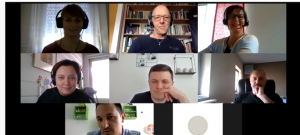Out of chaos comes order – remote working experiences in Pro-VET

Returning to work after the winter break at the beginning of March 2020, JAMK staff were told that in response to the emerging threat from the coronavirus outbreak, all but the most essential foreign travel had been forbidden by university’s management board. Immediately thoughts turned to cancelling flights and accommodation for those transnational meetings that had been so diligently planned for the spring. At that point in time the full consequences of the rapidly evolving situation did not occur to me immediately.
It was only after a week or so when I thought about how the Pro-VET work schedule might be affected did it dawn on me that I needed to act and act fast to make sure that planned work continued. As more and more national governments closed down their education establishments, sending staff to work remotely, in a concerted attempt to contain the spread of the potentially deadly threat, teachers in many countries began to turn to online platforms to ensure their students’ learning continued with as minimal disruption as was possible.
Pro-VET, as regular readers will know, aims to increase professional skills of VET teachers in Russia and Serbian HEIs and VET colleges by developing online pedagogical tools in the form of Vocational Open Online Courses (VOOCs). As part of the project, the consortium had been using different platforms for over 18 months at the time the outbreak started to have an effect on Europe. For example, the project management system and internal communication channels were built into the MS Teams environment and meetings had been successfully conducted using Zoom. Of course, other platforms were available if required as was traditional email if our chosen channels should somehow not deliver. The consortium was therefore well placed to operate in the virtual world of online communication to bolster momentum.

As colleagues began to retreat into the safety of their own homes, differences in access to project work began to appear. Some partners clearly enjoyed access to all areas within their responsibility while others had very little other than email outside of their campus. A meeting of the project Steering Committee was arranged using the Zoom online meeting platform to discuss and rearrange the transnational meetings that had had to be cancelled. During a one-hour meeting the spring programme was reorganized and work commitments rescheduled.
Life was different from that that we had all been used to, but it had to continue in spite of everything that was going on around us. Consequently, just like all our other colleagues around the world, the Pro-VET team, had to adapt to the restrictions placed upon us rapidly. It was not simply enough to rearrange the transnational meetings and park the project in the pending pile and wait for better days. Normal, everyday tasks of project work had to continue as well. A lot of collaborative work had to be completed so that the deliverables the project plan had promised could be produced on time. This was clearly work that could be achieved using our digital tools. Online mentoring of our Russian and Serbian partners’ VOOC development teams was arranged via Zoom and consequently VOOC development was taken to the next step.
The Quality Assurance Manual and Semantic Learning Analytical tools had to be completed among other tasks. The consortium thus set about utilising tools within the Teams environment to perform the necessary tasks, communicating via text and VoIP. The upshot is that now, after what seemed a very chaotic period during March, the project is back on track and we are getting things done. Incidentally, during recent coordination meetings with colleagues, I was informed that the lessons that had been imparted as part of the project’s train-the-trainer work package had been put to good use in recent weeks by both our Russian and Serbian colleagues. Perhaps this is the best indicator yet that this project is working well and will be a success.
Text by:
Graham Burns, project manager,
firstname.lastname@jamk.fi
JAMK University of Applied Sciences,
School of Professional Teacher Education
Photos by Eila Burns
